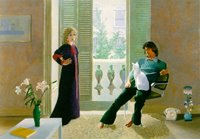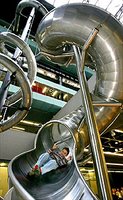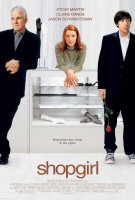 Mexican actor, director and cutie Gael Garcia Bernal was at the National Film Theatre for a talk on Monday. I couldn't afford to go but that's alright, cause the Guardian has a transcript of the whole interview.
Mexican actor, director and cutie Gael Garcia Bernal was at the National Film Theatre for a talk on Monday. I couldn't afford to go but that's alright, cause the Guardian has a transcript of the whole interview.
I recommend you read it all. He turns out to be a very politically engaged actor who is really giving all he has to make films with meanings and to improve his country's (Mexico) situation. Among other things, he has created his own production company and is launching a travelling documentary festival in Mexico, Ambulante.
Here are a few bits that interested me:
"It is truly impossible to take politics out of any story made in Latin America or Mexico. The place demands that you involve its history. It would be very disappointing not to use that wider scope. I think Y Tu Mamá También is a truly involved political film that will be more important in 10 years' time because it is a document of something that was happening in Mexico right after the fall of the PRI, the party that was in power for 72 years. So it is inevitable to be political and I must say it is irresponsible not to acknowledge it. It augments the fiction and it is there to be grabbed and used, without the politics having to be spoon-fed to the audience."
"[The Motorcycle Diaries] was a film where, if I'd been a bit detached from it, it would have been a useless experience. You had to give yourself and transform yourself as the two guys on that journey transformed themselves"
" I think that by working together is where Latin American cinema can find its place. I think we should work as a bloc: we share the same language - the case of Brazil is different, but we share the same circumstances and we might as well work together. You go to a film festival and you find one stand called Asian cinema - in Asia, they speak so many languages and the cultures are so very different, and there're more people and it's more diverse there. And then you go to the Mexican stand, the Argentinian stand, the Cuban stand, the Colombian stand and you're lost. We should work as a bloc"
"Almodóvar is one of those people who can give himself that luxury, he can start shooting any time he wants, he can hire any actor he wants. He's a great director. He's very specific - he tells you how many steps to take from here to there. If he says it's nine steps, you have to make it in nine. So that creates a tension, but it also creates a world"
"You asked about the nostalgic feeling in my work - well, that's the nature of it. There is this vision of Latin America as a place of pure celebration, but actually I see it as a cage of melancholy, but melancholy flies a lot and looks like a happy bird. Octavio Paz put it so well, it's a labyrinth of solitude."
"You might have an idea of what you're doing, but when you're on stage, you get lost. And that moment of losing yourself, of not knowing what the hell you're doing and thinking that you're going deep into a whirlwind and hoping that someone will catch you at the end, that is called a performance. That's when a director catches you, and that's when the audience acknowledges your leap of faith into something that's so incredibly unknown"
"I want to say one more thing before you leave, just one little thing. Whoever of you wants to be an actor, or film director, or writer or film producer or whatever. Honestly, I used to be sitting back there. I know this sounds like the biggest cliche ever, but it really is possible to tell a story and just go out and do it. Doesn't matter if only two people see it, doesn't matter if you get up on the stage and one of the lights goes out. It is important to tell a story and be faithful to yourself, be consistent. Just do what you like. So hopefully many people will go from here and do a film one day, even if it's in 10 years' time. I am very, very glad to be here and I'm getting very sentimental, but it's so important to me to be here. Thank you so much."


 Mexican actor, director and cutie Gael Garcia Bernal was at the National Film Theatre for a talk on Monday. I couldn't afford to go but that's alright, cause the Guardian has a transcript of the whole interview.
Mexican actor, director and cutie Gael Garcia Bernal was at the National Film Theatre for a talk on Monday. I couldn't afford to go but that's alright, cause the Guardian has a transcript of the whole interview.
 Watched Shopgirl, starring Claire Danes and Steve Martin, and thought it was really good. I cant work out if it was sparse or too sophitiscated. Let's say it is elegant. I cant work out if the story is believable or not, but let's say I related to it.
Watched Shopgirl, starring Claire Danes and Steve Martin, and thought it was really good. I cant work out if it was sparse or too sophitiscated. Let's say it is elegant. I cant work out if the story is believable or not, but let's say I related to it.